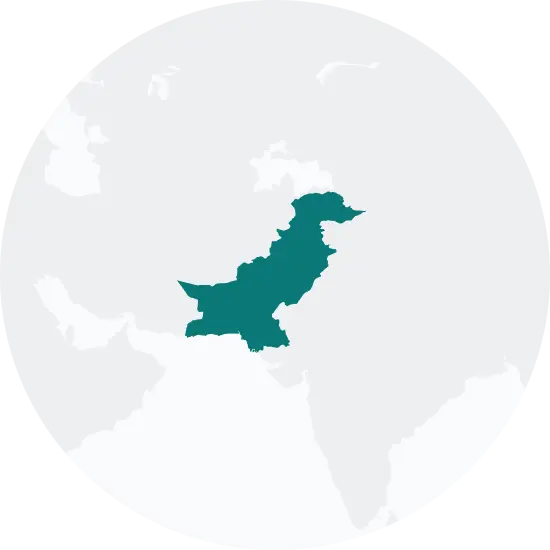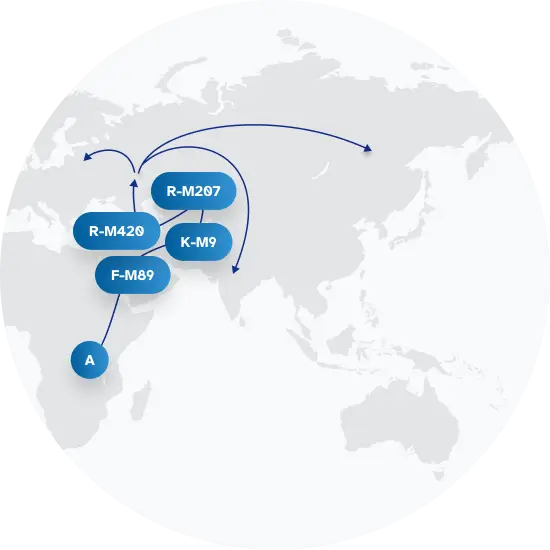Explore the Family Name Khan
How common is the last name Khan in the United States?
Based on the Decennial U.S. Census, the surname Khan has shown a significant increase in popularity between 2000 and 2010. In 2000, Khan was the 665th most common surname with a count of 46,713. However, by 2010, it had jumped to the 427th spot with a count of 76,171. This represents an impressive growth of about 35.79% in rank and roughly 63.06% in count over the decade. The proportion of people with the Khan surname per 100,000 also increased by approximately 49.08%, from 17.32 in 2000 to 25.82 in 2010.
| 2000 | 2010 | Change | |
|---|---|---|---|
| Rank | #665 | #427 | 35.79% |
| Count | 46,713 | 76,171 | 63.06% |
| Proportion per 100k | 17.32 | 25.82 | 49.08% |
Race and Ethnicity of people with the last name Khan
When it comes to ethnicity, the data from the Decennial U.S. Census indicates that the majority of individuals with the Khan surname identify as Asian/Pacific Islander. In 2000, about 70.50% identified as such, and this figure rose by 15.25% to 81.25% in 2010. The next largest ethnic identity group was those identifying with two or more races, although this saw a decrease of 66.28% from 15.63% in 2000 to 5.27% in 2010. White individuals accounted for about 7.92% in 2000, decreasing slightly by 13.01% to 6.89% in 2010. There were minimal changes in the proportions of Hispanics and Blacks with the Khan surname, while American Indian and Alaskan Natives experienced a minor growth of 14.89%.
| 2000 | 2010 | Change | |
|---|---|---|---|
| Asian/Pacific Islander | 70.5% | 81.25% | 15.25% |
| White | 7.92% | 6.89% | -13.01% |
| Two or More Races | 15.63% | 5.27% | -66.28% |
| Black | 3.26% | 3.86% | 18.4% |
| Hispanic | 2.22% | 2.2% | -0.9% |
| American Indian and Alaskan Native | 0.47% | 0.54% | 14.89% |
Khan ancestry composition
23andMe computes an ancestry breakdown for each customer. People may have ancestry from just one population or they may have ancestry from several populations. The most commonly-observed ancestry found in people with the surname Khan is Northern Indian & Pakistani, which comprises 52.8% of all ancestry found in people with the surname. The next two most common ancestries are Bengali & Northeast Indian (12.7%) and Central Asian (7.9%). Additional ancestries include British & Irish, Southern Indian & Sri Lankan, French & German, Iranian, Caucasian & Mesopotamian, and Spanish & Portuguese.
Ready to learn more about your ancestry? Get the most comprehensive ancestry breakdown on the market by taking our DNA test. Shop 23andMe
| ANCESTRY BREAKDOWN | COMPOSITION |
|---|---|
| Northern Indian & Pakistani | 52.8% |
| Bengali & Northeast Indian | 12.7% |
| Central Asian | 7.9% |
| Other | 26.6% |

Possible origins of the surname Khan
Your DNA provides clues about where your recent ancestors may have lived. Having many distant relatives in the same location suggests that you may all share common ancestry there. Locations with many distant relatives can also be places where people have migrated recently, such as large cities. If a large number of individuals who share your surname have distant relatives in a specific area, it could indicate a connection between your surname and that location, stemming from either recent ancestral ties or migration.
Based on 23andMe data, people with last name Khan have recent ancestry locations spanning a few countries, mostly in Pakistan, and Afghanistan.
| RECENT ANCESTRY Location | Percentage |
|---|---|
| Punjab, Pakistan | 50.10% |
| Khyber Pakhtunkhwa, Pakistan | 37.30% |
| Kabul, Afghanistan | 23.00% |
| Kandahar, Afghanistan | 17.60% |
| Punjab, India | 16.10% |
What Khan haplogroups can tell you
Haplogroups are genetic population groups that share a common ancestor on either your paternal or maternal line. These paternal and maternal haplogroups shed light on your genetic ancestry and help tell the story of your family.
The top paternal haplogroup of people with the surname Khan is R-Z93, which is predominantly found among people with Central & South Asian ancestry. Haplogroup R-Z93 is descended from haplogroup R-M420. Other common haplogroups include R-Y7 and R-M417, which are predominantly found among people with Central & South Asian and European ancestry. Other surnames with similar common haplogroups are: Sharma, Ahmad, Kumar, Hussain, Ahmed, Rahman, Shah, Singh, Malik, Rao.
The most common maternal haplogroups of people with Khan surname are: H, M30, U7. These most commonly trace back to individuals of Central & South Asian and European ancestry.
 Paternal Haplogroup Origins R-M420
Paternal Haplogroup Origins R-M420Your maternal lineage may be linked to Yu Hong
During the 6th century AD the Persian Empire controlled trade along the Silk Road through its Central Asian province of Sogdiana, providing a vital trade link between China and Europe. Evidence suggests there was a genetic connection as well. Researchers extracted DNA from the remains of a chieftain named Yu Hong, who was buried about 200 miles southwest of Beijing in 592 AD. His burial epitaph indicated that Yu Hong had Central Asian ancestry — and his DNA revealed an even more exotic background. Yu Hong's mitochondrial DNA belonged to the U5 haplogroup, a branch of U that is concentrated in Europe. This haplogroup assignment is a sure sign that he had European ancestors on his mother's side, and demonstrated the vast range of haplogroup U from the west to the east.

What do people with the surname Khan have in common?
Spoiler alert: it's complicated. People with the same last name are usually no more genetically similar than a randomly sampled group of people from the same population. That said, people with the same surname are more likely to have similar ancestries than randomly sampled individuals. The reason is the tendency of people with similar cultural or geographical backgrounds to preferentially mate with one another. That's why people who share a surname may be more likely to share traits and tendencies in common than people within the general population. Check out the percentages below to see the prevalences of tastes, habits, and traits of people with your surname compared with prevalences among 23andMe users.
Preferences
Traits
Habits
Wellness
Are health conditions linked to the last name Khan?
The short answer is that, if there is an association between surname and health, it's usually more about your ancestry than your name. Individuals with a given surname are no more genetically similar than the general population but often have similar ancestries. The populations of people associated with those shared ancestries often have sets of genetic variations, also known as alleles, in common. Some of those alleles are associated with a greater likelihood of developing certain diseases.
Disease variant frequency by ancestry
Disease allele frequencies in populations associated with the surname Khan are shown below. Important Note: not everyone with a disease allele will develop these health condition


























